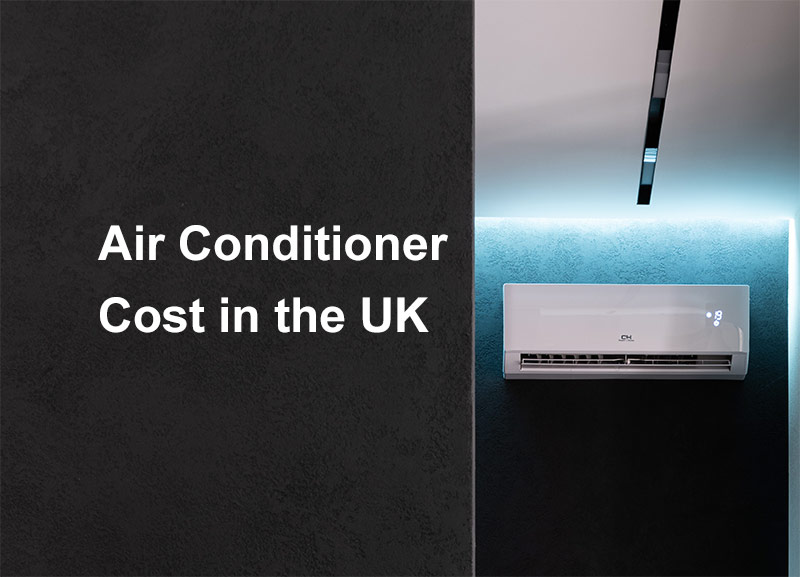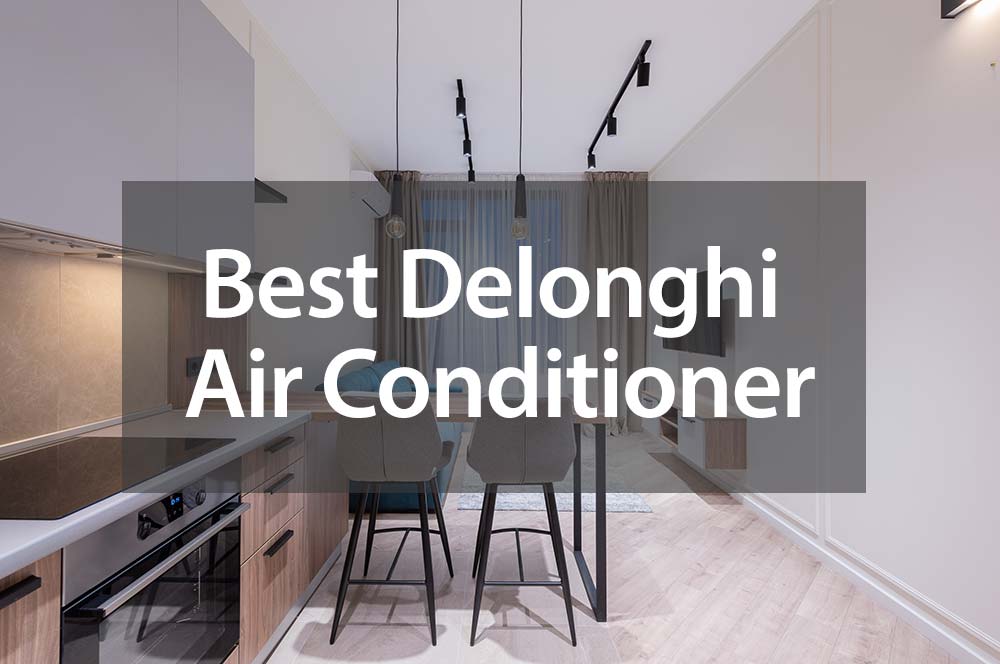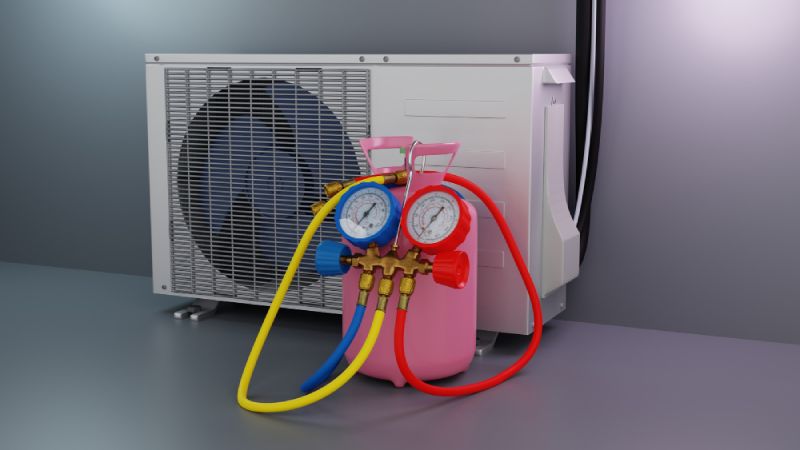While air conditioning is the norm in many warmer countries, it has never been common in the UK. However, as our summers are becoming hotter, domestic air conditioning is growing in demand with UK homeowners.
Air conditioning units help keep temperatures cool indoors, making them more comfortable for families and pets during the summer. Air conditioning is also a much safer option than leaving your windows open to let in cool air, which can be a security risk. Leaving windows open also draws in flying insects such as flies and wasps, which can then crawl over kitchen work surfaces and uncovered food.
There are many benefits to installing air conditioning in your home, but many homeowners are curious about installation charges and how cost-effective these units are.
How Much Does an Air-Conditioner Installation Cost?
There is no one-size-fits-all air conditioning solution for domestic homes. The installation costs vary according to your house type, the size of your home and the number of air-conditioning units you want to be installed.
This is why the average cost of installing air-conditioning in UK homes can range from £1200-£3500 for a small room to £1500-£4000 for a double bedroom. But again, the installation cost will depend on the room size of the rooms you want to air condition.
Monthly Air Conditioning costs UK
Running costs for domestic air conditioning units will depend on the type of unit you choose, the size of the room it is operating in, and how often you run your air conditioning system.
After paying for the air conditioning unit and installation, the running costs will be a crucial consideration. If you choose a unit with an output of 2.5kw for a smaller room in your home, it would cost roughly 10p an hour to run. A unit with an output of 3.5kw is a better fit for a medium-sized room and would cost around 14p an hour. A larger space would need a unit with an output of around 5kw, costing around 20p per hour.
Maintenance Costs
To keep your air conditioning system running optimally, you will need to keep it well maintained. Maintenance tasks and costs are pretty unique in the UK as we have a more temperate climate. This means you should schedule regular maintenance for your unit that includes:
- Cleaning exterior units that can become clogged with leaves, dirt and debris
- Check and top up the refrigerant now and again to prevent the unit from running dry (in the UK, this could be every year or two)
- Have an annual service from an electrical engineer
Professional maintenance costs will vary depending on what tasks need to be done. Many air-conditioning installers charge between £50-£75 per unit for a standard service and £100-£150 per unit for a major service.
Power use and efficiency
It is essential to consider the size of the rooms you want to air condition before choosing your unit. You need to ensure the air conditioner until will be capable of effectively cooling the room. Buying a smaller air conditioning unit because it is cheaper may be counterproductive because you will risk overworking an underpowered system.
Your air conditioning unit will struggle to cope with the task and may quickly become noisy, and will break down more easily. The long-term repair and maintenance costs for running a smaller unit will work out less cost-effective than buying a larger unit that is more suitable for the size of the room it is needed for.
Size of the house or room
You can use an online air conditioning calculator to find the most appropriate unit size and power to buy. In most cases, online A/C calculators offer calculations in BTU (British Thermal Units) or Watts. A/C manufacturers may also measure an A/C unit’s output in “Tons”. This measurement refers to the weight of air removed from the room in one hour.
Knowing your power requirement will allow you to narrow down a suitable range and size of air conditioning unit for your needs.
To cool large, open-plan rooms such as a kitchen and dining room space, you will need an A/C unit with more electrical power than for a smaller room. This also means your electricity costs will increase, but it can be more cost-effective than running a smaller unit that will struggle with the size of the room.
Air Conditioner Costs depend on the type of the unit
In general, you can choose between three types of air condition systems, and the cost of your A/C unit and the running costs will depend on which system you choose.

Inventor Chilly 9000BTU Portable 3-1 Air Conditioner
- 3 in 1 Air Conditioner, Dehumidifier, Cooling Fan
- 2 Fan Speeds
- Digital Display & Remote Control
- Effective for rooms Up to 215ft
The three types of air-conditioning include:
- Freestanding units: These are self-contained units that plug into your home electrical sockets. They are mobile, so they can be moved from room to room. If you want to run it at night in your bedroom to help you sleep, then move it in the morning to your home office or study so you can work in comfort; this is a flexible and versatile choice for you. These are easy to purchase and are very cost-effective at around £300-£400 per unit.
- Split air-conditioners: You will need a qualified air conditioning engineer to install this for you. A split air-conditioner unit is more pricey than a freestanding unit at £1,200-£3,000. However, it is a more cost-effective choice than buying a ducted version.
- Ducted air-conditioner: This type of air conditioning needs to be installed by a qualified A/C engineer. A ducted air conditioning system is the most expensive at around £2,500-£4,000. This is an option for homeowners that plan to stay put for a few years. If you move a lot for work or study, it would be more cost-effective to buy a freestanding A/C unit so you can take it with you when you move.
How to save money on running an air conditioning
You can do a few things to reduce your air conditioner system running costs. These include:
- Close doors and windows: Your A/C unit will burn more energy if your cool air is allowed to escape through open doors and windows. Keeping your windows open on a hot day will also enable cooled air to escape and warm air to enter your house, which defeats the object of having A/C.
- Run the fan on full speed: While this may sound counterintuitive, running your A/C fans on full speed can save you money. It will cool your room much faster than running fans on a lower setting, and once the room is cool, you can switch off your A/C unit.
- Change the air filters: Your A/C unit will run more efficiently on clean air filters. If the air filters are clogged up with dirt and dust, it will strain your machine and make it use more energy to operate.
- Use power-saving options: Many A/C units come with power-saving options that you can use via the controller to save electricity.
- Use blackout curtains or blinds: Heat can still enter your home through your windows, so closing your curtains or blinds will block the sun and reduce the amount of heat coming through your windows to warm up your room.
- Switch off your A/C when not home: When you go to work or out for the day or evening, don’t leave your air conditioning running, burning energy and producing cool air that you cannot use. You can set the timer to come on half an hour before you get home if you don’t want to walk into a warm house.
- Clean the condenser coils: Unplug your A/C unit and clean the condenser coils with water to eliminate the dust and grime buildup. Please ensure the coils are completely dry before plugging the unit back in and switching it back on.
Conclusion
Air conditioning units are a godsend during the increasingly hot and uncomfortable summer weather in the UK; however, just like your car or central heating system, they will need to be maintained well if you want to get the most cost-effective use from them.
Last update on 2024-05-02 / Affiliate links / Images from Amazon Product Advertising API





